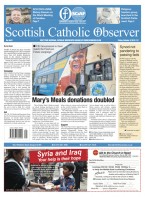September 26 | ![]() 0 COMMENTS
0 COMMENTS ![]() print
print

Acceptance and reconciliation
You cannot please all of the people all of the time—even within, or perhaps especially within, the Catholic community when it is as broad and as informed as our community is here in Scotland. The idea that the Scottish independence referendum would divide us as a people in Scotland and as religious communities was ‘manna from heaven’ to the secular media. While the Scottish Church stayed impartial, Scotland’s Archbishops did encourage the Catholic community to get out and vote.
Glasgow and North Lanarkshire council areas, where a high concentration of Scotland’s Catholics live, voted for independence against the vote towards keeping the UK together in the rest of the country. By and large, though, voters, activists and politicians maintained a dignified campaign in the run up to September 18, and activists, supporters, politicians and religious leaders have been gracious in accepting the result. Only the ‘lunatic fringe’ who blatantly tried to harness the result of the independence vote for their own out-of-date sectarian ends let Scotland down.
“The vast majority of Scots engaged with the referendum and it is our hope that we can all now cooperate for the benefit of our nation in future,” Archbishop Philip Tartaglia of Glasgow said on behalf of Scotland’s bishops when they accepted the result last week. “We urge the Catholic community to continue to engage in public debate and decision-making.”
“The untold energy of people who love Scotland and care about its future has been used up on opposite sides of this debate, now we have to find a way of harnessing all of that energy so that it can be used on the same side,” the Rt Rev John Chalmers, the Church of Scotland Moderator, added at the reconciliation service at St Giles Cathedral in Edinburgh on Sunday.
This doesn’t mean that some people, or around 45 per cent of voters, are not disappointed. It does not mean there is not still a cry for social justice and against Trident from within the Catholic community, by way of example. But as well as respecting the outcome of the democratic process, we must remember the message to ‘love thy neighbour’ and let go of the different sides of the debate.
While we have our own Episcopal hierarchy and Catholic school system, as well as a Scottish legal system and Scottish parliament in common with our fellow Scots, as Catholics we are members of the universal Church and we have always seen past our national borders, especially with the help of international aid agencies such as SCIAF and Mission Matters Scotland. So, as we move towards Mission month in October, let us look outwards and not inwards. In the words of Fr Eddie McGhee (page 10): “We all need to be reminded about the possibilities for building God’s kingdom rather than getting ourselves side tracked into building our own kingdoms.”











